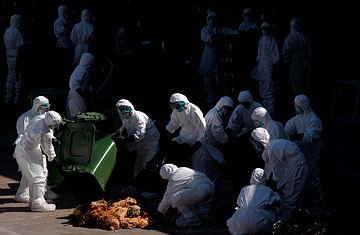
Health officers collect dead chickens at the Cheung Sha Wan wholesale market in Hong Kong on Dec. 10, 2008
Since 1997, when six people in Hong Kong died of avian influenza — the first confirmed human victims of the deadly virus — this southern Chinese city has been the front line in the fight against a potential global pandemic that scientists warn could ultimately kill millions. Unfortunately, the bird flu virus has proven a canny, and adaptable, enemy.
On Dec. 9, the Hong Kong government reported yet another outbreak of the virus at one of the city's largest poultry farms after 60 chickens were found dead. Putting the city on "serious alert" for further outbreaks, Hong Kong Secretary for Food and Health York Chow Yat-ngok announced a 21-day shutdown of the local poultry industry, suspending all live chicken imports from mainland China, which supplies about half its live wholesale markets, and culling 80,000 birds from farms near the outbreak's locus. York said Tuesday that there were no reports of humans sickened by the virus, and that the government had not yet determined whether the birds were infected with the potentially lethal H5N1 or a less virulent strain of influenza. (See pictures of the bird flu.)
Although Hong Kong health authorities have periodically found evidence of the H5 virus among wild birds in the city, this week's incident is the first outbreak on a Hong Kong farm since 2002, when nearly a million birds were slaughtered after dozens died of the flu. No human cases were reported that year in Hong Kong, but two people died in mainland China from the virus in 2003. (Globally, 246 fatal cases have been reported to date, according to WHO.) Hong Kong has since taken aggressive measures to limit outbreaks by vaccinating birds against the virus and reducing the number of live-poultry sellers licensed to operated in the city.
Those measures may no longer be enough. This week's outbreak is particularly alarming because some of the chickens killed by the virus appear to have been vaccinated against it, according to the government. Lo Wing-lok, president of the Hong Kong Medical Association and an expert on infectious disease, says that Hong Kong uses an older version of the H5 vaccine than mainland China, where there are more frequent outbreaks and farmers vaccinate poultry specifically against the H5N1 strain of the virus. (See pictures of Hong Kong from 1997-2007.)
While the older, umbrella vaccine has proven effective in the past, Dr. Lo says it may be losing its potency as newer strains of the virus spread around the region. A new study by University of Hong Kong microbiologists of a virus outbreak earlier this year found that chickens that had been vaccinated against the H5 virus had only one-quarter as many antibodies as those vaccinated in 2001. Yuen Kwok-yung, head of the University's microbiology department and an expert on avian flu, warned recently that the vaccine may be approaching total failure.
That's a dire prediction given that further outbreaks are expected throughout Asia in the coming months, according to Peter Cordingley, a spokesman for the World Health Organization. Cordingley says he's not surprised that the virus, which spreads most readily via wild birds migrating during the winter months, has struck Hong Kong again. "I'm disappointed because Hong Kong has done so well since this outbreak started," Cordingley says. "But this is a very versatile virus. It's on tractor wheels and in wild birds. It may be found on a farmer's boots. We've seen this virus embedded right across Asia." Dr. Lo, too, says the city's proximity to China's Guangdong province, the epicenter of many recent bird flu outbreaks, renders it vulnerable as the virus inevitably mutates and spreads. "In the last year, there have been two episodes among poultry in Guangdong," he says. "The virus has been very active."
Given that another flu outbreak among humans in densely populated Hong Kong could quickly turn into an epidemic, many health experts suggest that it is well past time to update the vaccine to meet the evolving threat. "When the time arrives that the old vaccine no longer works, I believe we should have another to put in its place," Dr. Lo says. "Apparently we do not."
But even effective vaccination may only forestall outbreaks of the tenacious virus. "Vaccination is recommended WHO policy, but it's not a panacea," Cordingley says. Farmers and local governments around the region still need to be vigilant about testing birds for the virus and keeping wild birds from infecting poultry farms. "The vaccine by itself doesn't work. You can't just vaccinate and walk away."
